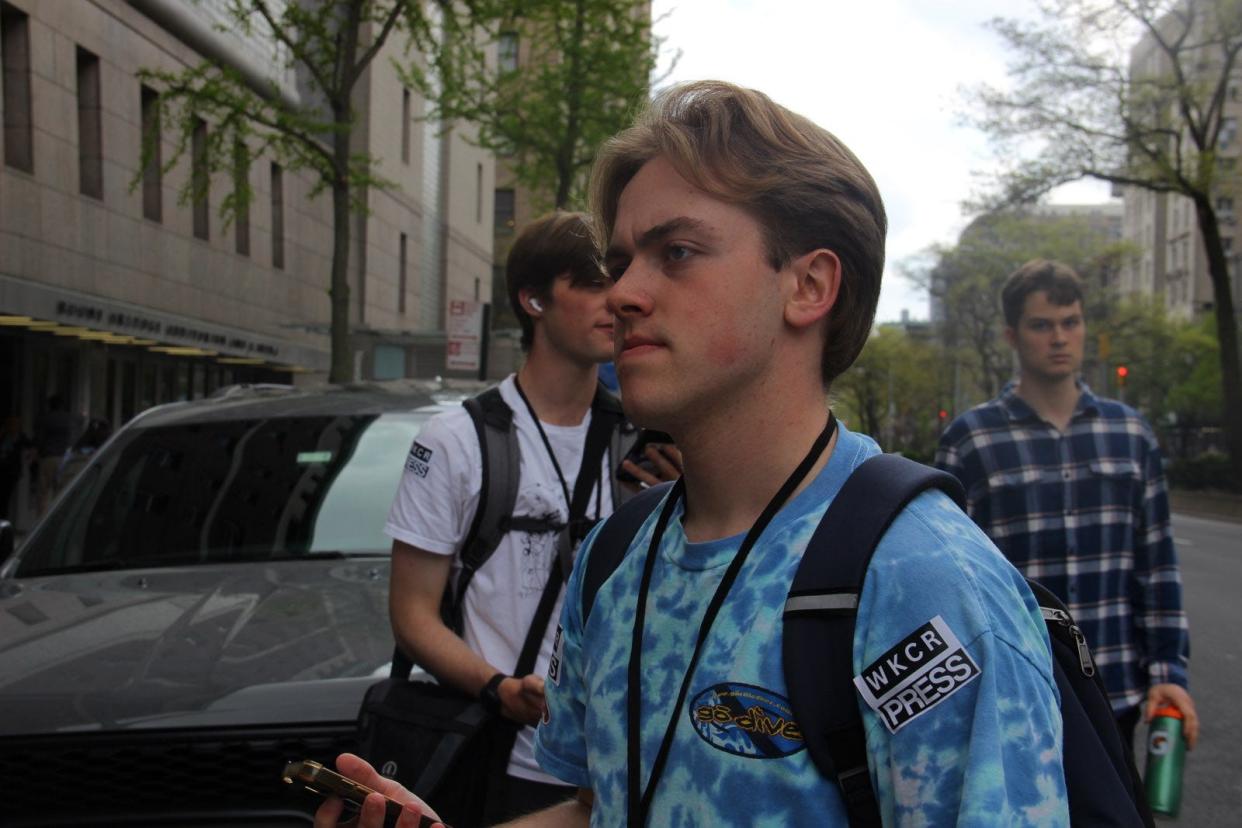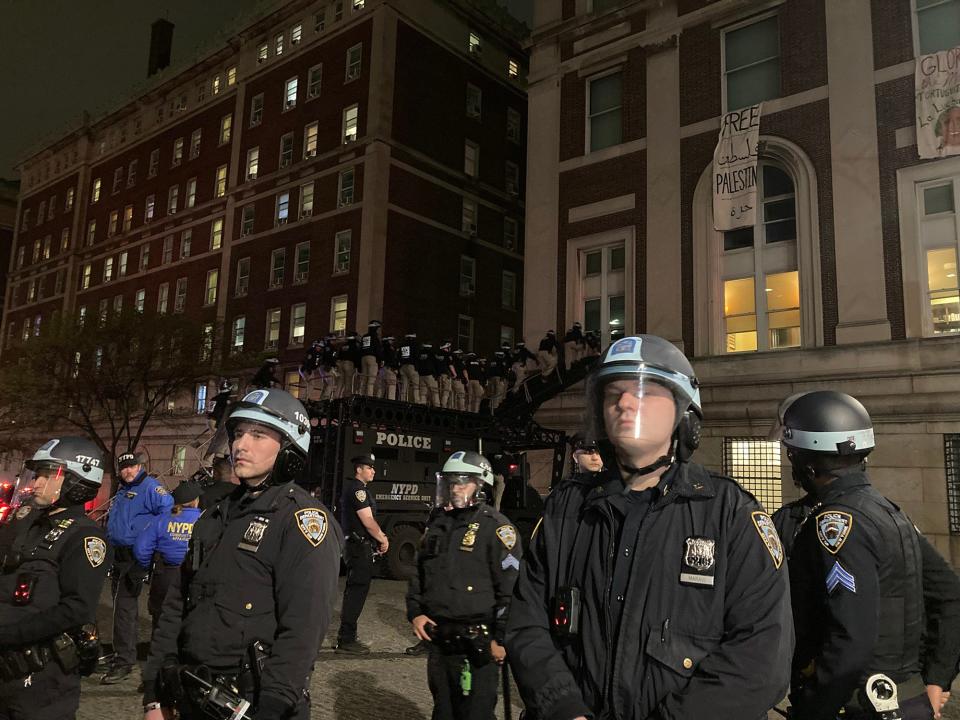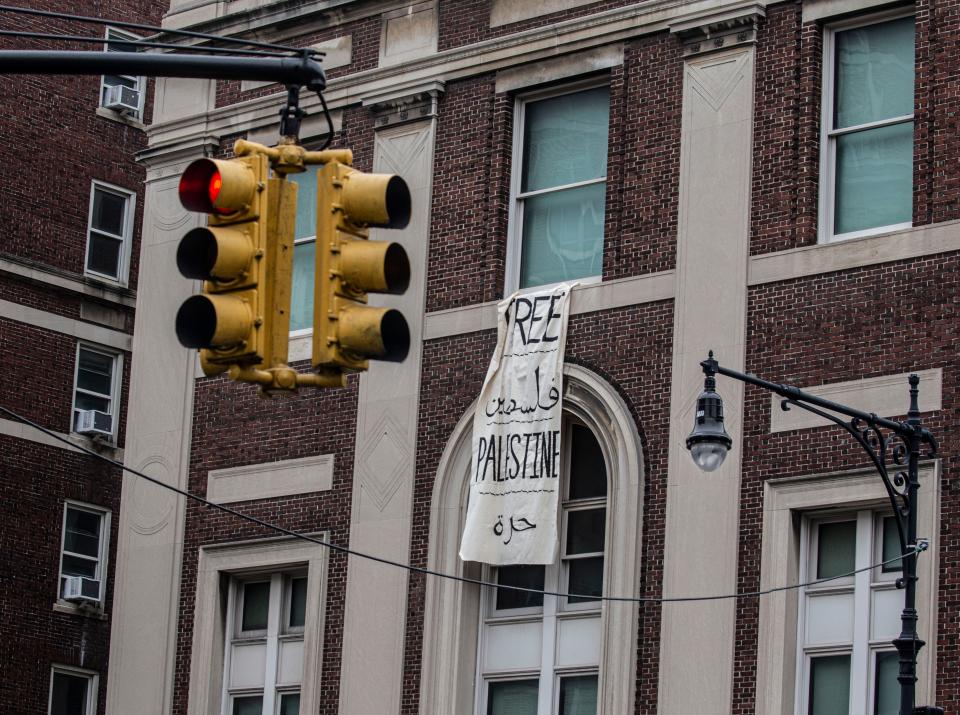In thick of Columbia University chaos, Akron native steps into role of student reporter

For 13 tense days last month, New York's Columbia University was gripped by protests over Columbia's investment in companies profiting from the current Israel-Hamas war. A student from Akron was thrust into reporting on much of the campus turmoil April 17 to 30, just weeks after he joined a campus radio station for a gig as a music DJ.
Sawyer Huckabee, 20, grew up in the Rubber City. He attended Archbishop Hoban High School before enrolling at Columbia as an English major. Three or four weeks before the events of April 17, Huckabee joined 89.9 WKCR-FM, the student-run radio station that operates independently from the college. It's been broadcasting 24/7 throughout the protests.
Some of Huckabee's friends were running the station and he wanted to be able to play music on-air, he said.
"But once the encampment started on the 17th of April, they needed a bunch of hands on deck. And so I offered to help," said Huckabee. At first, he was providing food and other supplies to field reporters, some of whom were his friends. He soon asked if there was more he could do.
The station turned him into a field reporter, providing a crash course on how to operate — showing him how to use equipment and teaching him how to objectively and accurately describe events.
Sleep and food were scarce commodities for him during the height of the protests.
On April 30, Columbia responded to protesters breaking into and occupying Hamilton Hall by locking down campus — barring entry to anyone besides students who live on campus and key personnel. The move stranded Huckabee on campus for roughly 27 hours with only two hours to sleep, he said. If he left to return to his dorm, he wouldn't have been able to reenter Columbia's grounds. So, he and his colleagues slept at Pulitzer Hall to avoid leaving campus.
Since the lockdown, reporting has focused on protests happening outside Columbia's gates.
Balancing his academic duties with his journalistic responsibilities meant marathoning through his finals during a lull in the action.
"It's a little hard sometimes, but I think it's worth it," he said.

Columbia student Sawyer Huckabee joins protest coverage team
Huckabee was part of a 19-person cohort of student journalists, many of whom, he said, were, like him, drawn to radio work by the prospect of deejaying. While the pro-Palestinian protests have been happening on and off since October, Huckabee said he had no inkling of what he was getting into when he joined the radio station.
When something big happened, the radio crew would disperse in pairs across campus, gathering as many points of view as possible. That's how Huckabee ended up interviewing students inside the encampments about the protests — and how he found himself outside Hamilton Hall as protestors were breaking in.
As part of these duos, Huckabee said that he's interviewed pro-Palestinian and pro-Israel demonstrators, political scientist Norman Finkelstein and uninvolved bystanders in an attempt to cover as wide a range of experiences as possible.
An interview that stands out to him in particular took place one night in one of the encampments. Accompanying him was Ian Pumphrey, the head of the station's News and Art Department, and a friend of Huckabee's named Leon Zhou, a fellow student journalist at the radio station.
A student tried to walk into the encampment, but the participants locked arms and tried to "sing him out" in a moment that Huckabee said went viral online.
In their interview with the student afterwards, Huckabee said the student was frustrated with being categorized as a "counterprotester."
"He was just wondering why he wasn't allowed on the encampment," Huckabee said.
The interview "opened his eyes," he said, to the importance of careful word choice in journalism.
"How can we delineate that they are necessarily pro-Palestine and pro-Israel if they're just a bystander?" Huckabee said. "And so I think that's been a challenge at the station that we've overcome, trying to hone down the language and be as precise as possible."
Newly minted reporter gathers range of views on Columbia situation
Huckabee balks at describing the protests as entirely peaceful or violent, but he said tensions rose during the larger protest gatherings on campus and that there's been a general discontent with the college administration.
"I think there's a hostile atmosphere at times," he said, "and that's not necessarily characteristic of the entirety of the events.
"I think, going about your day on campus in the past two weeks before they actually locked down campus, you could probably get away with just going to class when there's nothing going on for parts of the day," Huckabee said. "But other parts of the day when there's picket lines and there's counterprotests, there's intel that NYPD is going to come on campus and shut the campus down — those are the moments when I think tensions rise noticeably and hostilities start."
In the midst of the protests, Huckabee said he's gotten mixed perspectives from uninvolved students. Some didn't feel safe on campus and stopped going to class. Others carried on like nothing was happening.
Huckabee said he can't speak to New York City Mayor Eric Adams' suggestion that the protests were hijacked by outside agitators.
"However," he said, "I will say definitively that WKCR has confirmed that there are students there."
According to a May 2 update from the school, 13 of the 44 people arrested at the Hamilton Hall occupation were "unaffiliated" with the university.
None of the reporters at WKCR were arrested during the protests. However, due to the amount of people protesting, Huckabee said he felt comfortable speaking for the whole student body when he said that everyone knows someone who's been arrested over the protests.
Because the station is paid for through fundraising, Huckabee said, there haven't been many "administrative encounters," a beneficial circumstance allowing them to remain objective.
"We don't have to bias ourselves to the university," he said. "And we've made a very strong commitment to not bias ourselves to any sort of political institution or any protester. So we've just been collecting as much information as we can."

Akron reporter is at scene as Hamilton Hall occupation begins
Hamilton Hall has been the site of protests before over the past several decades, a history that Huckabee is aware of due to the university's history with student activism. At the radio station, he said, they've been talking on-air about the symbolism of the protests.
"So it was a bit surreal to see images in real life that copy historical images that we've seen from other protests at Columbia," he said of witnessing students breaking in to occupy the building.
On May 2, the Pulitzer Board — which awards some of the most prestigious honors in U.S. journalism and is based at the university — issued a statement praising the work of student journalists covering the protests.
"In the spirit of press freedom, these students worked to document a major national news event under difficult and dangerous circumstances and at risk of arrest," the board said.
While Huckabee doesn't think that he'll pursue journalism as a career, he said, the experience has been "eye-opening" and he's bonded with his colleagues throughout the ordeal.
"It's been quite a balancing act as we've all been working under a lot of stress, a little sleep," Huckabee said. "But we've all kind of formed a shared purpose and a community because we've been together so much, and I guess seen so much together.... And we talk about how we sort of don't want to leave each other because we're so bonded to each other for the past two weeks."
Contact reporter Derek Kreider at DKreider@Gannett.com or 330-541-9413
This article originally appeared on Akron Beacon Journal: Akron native covers Columbia University protests as student reporter

